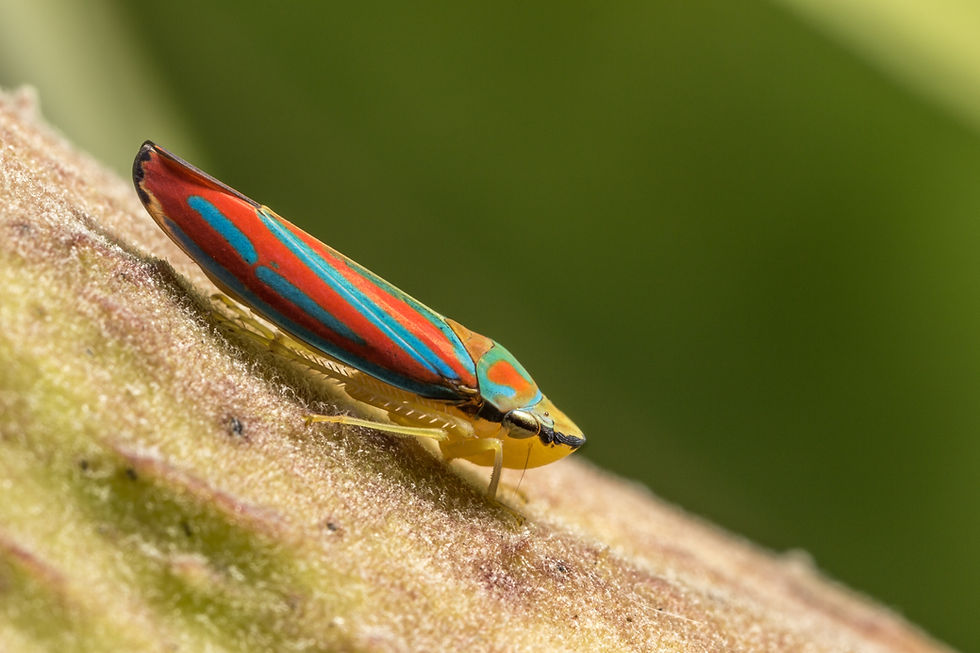Whale-friendly Fishing: A Deep Dive Into Ashored’s Sustainable Fishing Technology
- SciCan

- Jun 10, 2025
- 5 min read
Updated: Aug 2, 2025
Ashored is a special kind of startup that's helping a traditional industry transition into — and thrive within — a sustainable future.

Preserving Marine Ecosystems and Livelihoods in Canada's Fishing Industry
Hundreds of kilometres from Canada’s startup hubs, a sustainable tech company is rising from the waters of Halifax, in the heart of Canada’s fishing community.
Cofounded by Halifax locals Aaron Stevenson and Ross Arsenault in 2017, Ashored is charting new fishing territory with fishing gear solutions that maximize yields while protecting ecosystems.
The company’s flagship technology is built to minimize fishing gear entanglements and losses, which have long threatened marine life in Canada and abroad.
"In 2017, 17 endangered North Atlantic Right Whales died off our coasts from entanglements in fishing gear and ship strikes. The problem threatened the industry with more than $2B worth of annual exports at stake. It was a problem that struck at the very heart of the region."
— Aaron Stevenson, Ashored CEO & Cofounder
That heavy loss, and the resulting toll on the industry, signaled an urgent need for innovative solutions to protect marine life and the livelihoods that rely on local fishing.
The global fishing industry's environmental impact is infamous, from overfishing and bycatch to habitat degradation. According to NOAA Fisheries, maritime activity continues to have a severe effect on the North Atlantic right whale population of only ~360 individuals and fewer than 70 females of reproductive age.
Fishing also contributes to our global plastic pollution problem:
46% to 86% of plastic in the Great Pacific Garbage Patch originates from offshore fishing and aquaculture
640,000 to 1 million tonnes of fishing gear is lost or discarded in the ocean every year, making up 46% of the Great Pacific Garbage Patch
10-20% of global marine plastic pollution is ghost fishing gear
“Healthy oceans are essential for healthy lives… Living here, the oceans are very much part of who we are. It is our culture, our heritage, and, for many, our livelihood and our future.”

Building Deeper Intelligence: Ashored's Smart Buoy System
Marine life usually gets into trouble near the water's surface, where most fishing gear is found. But Ashored's system keeps all fishing gear — cages, buoys, and ropes — safely on the seabed until needed by fishers at the surface.
The system also creates a digital map of the gear on the seafloor, which eliminates the need for surface buoys. By minimizing gear loss, Ashored also helps reduce ocean plastics and ghost fishing, where lost or abandoned fishing gear continues to catch marine life.
“Everything is controlled by a deckbox from the vessel, along with Ashored’s gear marking and retrieval software, developed in-house.”
Ashored's system — designed with input from fishing teams — is built to be trap agnostic to promote long-term sustainability and compatibility with a fisher’s existing crab and lobster gear.
Here's how it works:
When needed, the gear is released with an acoustic trigger, and the buoys, rope, and cage lift to the surface.
Everything is managed with a deck box on the vessel, which is integrated into Ashored's proprietary software.
System sensors collect data like temperature and gear location.
Real-time tracking helps fishing teams quickly locate traps, particularly in bad weather, reducing the likelihood of creating marine debris.
Smart tags on the buoys enable GPS and IoT capabilities so gear can be tracked gear accurately, reducing the time and fuel spent searching for lost equipment.
“Direct feedback from fishermen is very valuable to every aspect of our design and innovation process.”

"Ashored has designed the systems to integrate as smoothly as possible into current fishing practices..."
An Early Success Story: Keeping Cape Breton Crabbers in Business
The Ashored system is already helping fishing teams navigate regulations while staying profitable.
In early July 2024, North Atlantic Right Whale protection measures took effect, leading to temporary fishing closures in several zones off the Cape Breton coast. Fishers were required to remove all traps within 48 hours, but the teams equipped with Ashored's Rope-On-Command system were able to continue fishing and meet their quotas.
That option can make an immense difference for a fishing community. For example, a moderate snow crab catch of ~1,000 pounds a day at a conservative price of $5 per pound could gross ~$5,000 a day for one fishing team.
"We collaborate with fishery associations and others to ensure that the technology we develop and deliver is not only effective today, but also prepares them for the market of tomorrow."

Ashored's Biggest Challenges: Underwater Acoustics and the Regulatory Landscape
Harsh marine environments pose unique challenges, from dealing with underwater noise interference to ensuring durability against deep-sea pressures.
Underwater Noise: Differentiating between acoustic commands and background noise required advanced noise rejection techniques.
Durability and Reliability: Ensuring the release mechanism’s functionality under high-pressure conditions necessitated robust materials and coatings.
Balancing Design Factors: Optimizing cage weight, release mechanism strength, and buoyancy was critical for visibility and reliability.
"Beyond Canadian borders, the team has worked closely with agencies like [NOAA] and the US Coast Guard to understand and comply with the regulatory requirements for deploying our technology in US waters."
— Aaron Stevenson, Ashored CEO & Cofounder
Regulatory and Environmental Considerations
The regulatory landscape can vary widely across regions, both domestically and internationally. Navigating those regulatory landscapes requires long-term engagement with federal and state agencies to ensure compliance.
Ashored collaborates with organizations like the Sustainable Fisheries Partnership and government agencies like Fisheries and Oceans Canada to develop industry-wide best practices, and also engages closely with First Nations associations, like Millbrook First Nation and Peskotomuhkati First Nation, to integrate traditional ecological knowledge into their operations.

"A future feature we are developing will enable us to tie logged environmental data from our MOBIs with fishing activity."
360° Sustainability: Charting a Better, Sustainable Course in Fishing Technology
From using recyclable fibres to testing the entire system while wearing fishing gloves, the Ashored team is heavily focused on optimizing product materials. It aims to reach 100% recyclability in future product iterations.
The team will also incorporate environmental data logs, traceability, and automation to enhance its system functionality and expand the scientific research potential.
Innovation, of course, is only as powerful as accessibility allows. So, costing is key to sustainable fishing. To ensure accessibility for small and medium-sized fisheries, Ashored offers a seasonal leasing model at $100/unit/month to make technology adoption financially feasible.
"Traceability and sustainability will help encourage the adoption of this technology aiding in setting fair market prices for its use. Additionally, we are investigating methods of introducing automated behaviour to our system to ensure harvesters can focus on their job."
— Aaron Stevenson, Ashored CEO & Cofounder
Global Perspectives: Ghost Gear the World Over
Every year, an estimated 650,000 animals — whales, dolphins, seals, turtles, and other small cetaceans — are trapped by ghost gear. As much as 1 million tonnes of that gear pollutes oceans worldwide, making ghost gear one of the most severe yet overlooked sources of ocean pollution.
Indeed, the United Nations has recognized ghost fishing as a major threat to marine ecosystems, communities, and even fisheries that are dependent on healthy ocean biodiversity.
From Canada and Norway to Australia, countries increasingly acknowledge the need for collaborative solutions to combat this problem. Now, fishing communities are increasingly seeking technical solutions to bycatch that are both sustainable and practical.
These are sobering challenges. But if Ashored's mission is any indication, scalable solutions are close on the horizon.
🍁 Subscribe for weekly updates from Science Canada →


















Comments